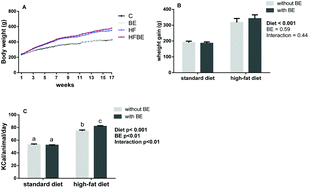Effect of chronic consumption of blackberry extract on high-fat induced obesity in rats and its correlation with metabolic and brain outcomes
Abstract
Flavonoids have been presented as potential protectors against metabolic and cognitive dysfunction. However, mechanisms underlying these ‘claims’ have not been sufficiently explored. To analyse the effect of long-term supplementation with blackberry extract (BE) in the context of a high-fat or a standard diet, Wistar rats were divided into 4 groups (n = 6) fed with a standard or a high-fat diet, with or without BE supplementation at 25 mg per kg body weight per day. A high-fat diet significantly impaired glucose tolerance and increased body weight, caloric ingestion, very-low-density lipoprotein, triglycerides and cholesterol. Furthermore, it was observed that a high-fat diet increased dopamine content in the prefrontal cortex and decreased brain derived neurotrophic factor (BDNF) levels both in the prefrontal cortex and in plasma. BE supplementation only affected some of these aspects. BE slightly improved glucose metabolism and significantly decreased levels of lactate, independent of diet. BE decreased levels of BDNF and also interacted with the dopaminergic system, increasing dopamine turnover in the striatum, and reverting dopamine content induced by a high-fat diet in the prefrontal cortex. This study shows that, despite some particular benefits of anthocyanin supplementation, some long-term effects may not be desirable and further studies are needed to optimize ingestion conditions.



 Please wait while we load your content...
Please wait while we load your content...